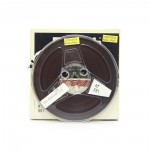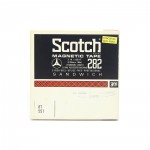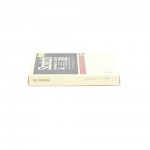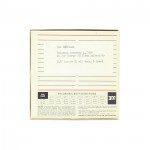Introducer - George Bowering
00:00:00.00
Welcome to at last the second reading in the series, for this year. As you probably know, the series that we have, it might be loosely called a kind of an avant-garde series, and in the, this is our fifth year, and this is the first time we've ever had anybody from the New York School--it's not going to be the last time, we're going to have Kenneth Coke in the spring, and we're looking for Tom Clarke, next fall. Berrigan is I guess now, one of the, say the halfback, I supposed, or quarterback of the New York School. Many of you have probably seen...[laughs] yeah, linebacker! When you ask when you're a little thin... And most of you have probably seen the propaganda sheet that's been around, downstairs and so on, and so you've heard the words that some of his confreres have said about him. I'd just like to add a little bit, in addition to those earlier books such as The Sonnets, and Bean Spasms, there's a couple of new books that have just appeared, one's called In the Early Morning Rain, which will be available here because it's a Cape Goliard book, and it's distributed in Canada by one of the big Toronto publishers, and another one with a Kraut title that I can't read that's bilingual, half-German and half-English that I'm sure we'll hear some from....
Ted Berrigan
00:01:31.32
[Off-mike, quiet] The title's [inaudible] Guillaume Apollinaire ist ...
Introducer - George Bowering
00:01:34.20
Oh I see, yeah right.
Ted Berrigan
00:01:35.90
[Off-mike, quiet] However I don't have any available, only in Berlin.
Introducer - George Bowering
00:01:38.91
Right, so if you happen to be in Berlin, snap up a copy of Guillaume Apollinaire ist tot und Anders. So I'd like to mention that Ted Berrigan is going to read one set, and then he wants to stop for a very short intermission, say like a five-minute intermission, and then haul you back in again and do a second set. So ladies and gentlemen, etcetera, Ted Berrigan.
Annotation
00:02:05.77
Applause.
Annotation
00:02:07.68
Cut/Edit made in tape; unknown amount of time elapsed.
Ted Berrigan
00:02:08.13
In the first set I'm going to read mostly poems I've written over the last four or five years. Actually, longer than that, some going back to 1962, or '61. I don't know how long this set'll be. It'll, should be less than a half-hour. In the second set I'll read poems I've written over the last year or two. However I want to start with a poem that I wrote about two years ago. It's called "Heroin." I read this in high schools in Ann Arbor which I went to read in a program called Poetry Ann Arbor, and I wanted, I read the title and then I wanted to, I read the title and then I wanted to, I found it real funny because it was called "Heroin," and I wanted to disclaim that it was a pro-heroin poem. So I said, this poem is not a pro-heroin poem. Then I realized there wasn't an anti-heroin poem either. So I ended them it was just sort of an on-heroin poem. [Laughter.] All my poems are pretty much alike, and this is fairly typical of what you'll be hearing the rest of the evening.
Annotation
00:03:19.81
Reads "Heroin" [INDEX: list, heroin, photograph, Kerouac, Anne, heart, light, streets]
Ted Berrigan
00:04:22.38
This poem is called "Frank O'Hara's Question." Frank O'Hara is a poet from New York, who's dead, he died when he was forty years old a couple of years ago in an automobile accident. The title doesn't have too much to do with the poem, except that it sort of states something that Frank O'Hara evidently had to say, and so it says something that I have to say too in my own way, not that I have to say it the same way that Frank did.
Annotation
00:04:56.23
Reads "Frank O’Hara’s Question" [INDEX: Frank O'Hara, list, sky, letter, Isaac Dennison, high, happy, long poem, art, guard, mess, message]
Ted Berrigan
00:05:42.96
This is a poem I wrote in 1962. It's called "Words for Love." It's a bit rhetorical, but it's the best I could do in 1962, and I still like it a lot, albeit I wonder at some of it. "Words for Love." It was written, actually, at a very difficult time in my life, and I guess I felt the need to make some sort of statement.
Annotation
00:06:09.17
Reads "Words for Love" [INDEX: winter, snow, read, poetry, weakness, obsession, Jackson Pollock, Rilke, Benedict Arnold, psyche, high, drugs, poems, list, words, time, lady of the lake, God, heart]
Annotation
00:08:07.51
Reads ["I wake up 11:30, back aching" [INDEX: confessional, New York, Pat, Ron, birthday, Pepsi, high, class, book, Juan Gris, poems, ballad, sonnet, Shakespeare, Auden, Spenser, Stevens, Pound, Frank O'Hara, Jan, Helen, Babe, David, ego, self, wonder, toilet paper]
Annotation
00:09:23.32
Reads “Personal Poem #7. [INDEX: confessional, New York, drugs, sex, John Ashbery, food, write, stealing]
Annotation
00:10:23.85
Reads “Personal Poem” [INDEX: confessional, diary, journal, love, Ray Joss, New York, court, wife, police, John Stanton]
Ted Berrigan
00:11:07.63
[Applause] Thank you. Charlie Stanton liked that one too. [Laughter] This is the last one of those kind of poems. [Laughter.]
Annotation
00:11:21.12
Reads “Personal Poem #9” [INDEX: confessional, journal, diary, Brooklyn, New York, Pepsi, food, memory, book]
Ted Berrigan
00:12:32.78
I've always liked that poem. [Laughs] All of those are written around 1962, 61 and 62. I want to skip up to around 1967. I wrote this poem called "Things to do in New York City." I was leaving New York, and this poem, like many of my poems, was written for a specific occasion. It was for someone's birthday. And the poem, it's just my poem, it's not about the other person's birthday, it's just a present for him on his birthday.
Annotation
00:13:24.78
Reads "Things to do in New York City" [INDEX: confessional, occasional poem, city, New York, By the Waters of Manhattan, drugs, cigarette, read, break, girls, love, death, birth, friends, departure]
Ted Berrigan
00:14:20.38
This poem is called "Ten Things I do Every Day," which is...it's true, as a matter of fact, in a way. In a manner of speaking. But it's not true that it's ten things. Alas. But that was just the title, like the ten greatest movies of the year.
Annotation
00:14:40.12
Reads "Ten Things I do Every Day" [INDEX: New York, waking, smoking, pot, love, eating, food, cat, sound, song, streets, read, children, friends, Pepsi]
Annotation
00:15:16.64
Laughter.
Ted Berrigan
00:15:21.61
That's what you do in New York. [laughter] I'll read this poem called "Resolution."
Annotation
00:15:35.70
Reads "Resolution" [INDEX: city, New York, snow, winter, New Year's, driving]
Ted Berrigan
00:15:58.25
I don't know what I'll do about it if you do, but...something. All those dramatic poems.
Annotation
00:16:06.67
Reads “Sonnet XXXVII” [INDEX: night, sleep, Guillaume Apollinaire, poem, dream, crying, song, library, tear, light]
Ted Berrigan
00:17:08.23
I want to move around a little and not do exactly what I said. This is a poem I wrote last summer in London, it's dedicated to the poet Tom Raworth and his wife. They lived in Colchester, which is an hour or two train-ride from London, and I was supposed to go down and see them, and I didn't go. And by way of apologies, I wrote this poem to Tom and to his wife, Val.
Annotation
00:17:33.84
Reads "Apologies to Val and Tom" [INDEX: place, London, apology, night, city, memory, remembrance, New York, friend, poem, visit]
Ted Berrigan
00:19:05.81
I'll read this one for George Bowering's old lady, [laughter] Mrs. Angela Bowering. It's called "Things to do on Speed." [Laughter]
Annotation
00:19:19.52
Reads "Things to do on Speed" [INDEX: list, typewriter, mind, writing, book, desk, Pepsi, sleep, dream, paper, song, sickness, drugs, imperative, talking, New York, city, work, hallucination, high, sex, heroin, speed]
Ted Berrigan
00:20:55.58
[Laughs after the line, "Dismantle twelve radios."] I forgot about that one. [Audience laughter]
Annotation
00:21:03.10
Continues "Things to do on Speed"
Ted Berrigan
00:22:21.29
I wrote that one courtesy of the New York Times. Okay, one more this set. This is called, "Things to do in Providence" [Laughter] which is, Providence, Rhode Island, or whatever else you can make of it.
Annotation
00:22:50.77
Reads "Things to do in Providence" [INDEX: confessional, place, Providence, Rhode Island, city, drugs, imperative, list, food, TV, war, Texas, movie, Western, tear, cowboy, New York, drunk, children, phone, talk, family, mother, birth, work, cigarette, hippie, teenager, home, car, death, grandmother, heart, stranger, sleep]
Annotation
00:26:23.61
Loud audience laughter follows the line, "How'd you like a broken head, kid?!"
Annotation
00:26:29.20
Continues "Things to do in Providence"
Annotation
00:27:46.95
Applause concludes this reading.
Ted Berrigan
00:27:52.96
[inaudible]
Annotation
00:27:55.24
Cut/edit made in tape; unknown amount of time elapsed.
Introducer - George Bowering
00:27:55.34
Here he is again, terrible Ted Berrigan.
Ted Berrigan
00:28:01.33
All the poems I'm going to read in this set are from my book, In the Early Morning Rain. The title of this book I got from Gordan Lightfoot, the Canadian folk singer-songwriter, and I didn't know, I made, I decided to use that title before Bobby Dylan's album Self-Portrait came out, so I didn't know that Bobby was going to record this song. I would have used it anyway, I'm sure. But, I mean if Dylan can steal it, I can steal it. And this book is a collection of poems of mine from over the last ten years, and I'm just going to read around in it. I wrote a lot of different kind of poems. I don't very often try for...I mean, I just take my poems where they come. This poem is called "Hello."
Annotation
00:28:51.84
Reads "Hello" [INDEX: hello, etymology, health]
Ted Berrigan
00:29:06.29
Now I'm going to read two or three poems that are from a section of this book called "Life of a Man." "Life of a Man" is a book of poems in Italian by an Italian poet, a very great Italian poet who died not too long ago called Giuseppe Ungaretti. There's a little story behind these. A lady poet named Barbara Guest once asked my friend Ron Patchett and I, would we translate some of Ungaretti's poems, because Ungaretti was coming to America. And she thought it would be nice if we would translate them as a sort of homage to him. And so I told her, I said, Barbara, but we don't understand Italian, and she said, Oh, I'm sure you can do it, you two are marvelous. And she said, ‘Just get a dictionary, and you can look up the words’. So I looked at Ron and he looked at me, and we said, yeah, we can translate 'em, sure, but we don't want to get any dictionaries. So we just translated 'em without any dictionaries. [Laughter] And we never showed them to Ungaretti but we showed them to Barbara Guest and she had the horrors. The first one is called "Matinee."
Annotation
00:30:16.71
Reads "Matinee" [Laughter] [INDEX: translation, morning]
Ted Berrigan
00:30:26.09
The next one is called "December." [Laughter]
Annotation
00:30:30.81
Reads "December" [Laughter] [INDEX: translation, farewell, mother, brother, sister, sex, heart]
Ted Berrigan
00:30:38.20
And this one is called "The Reply to the Fragile."
Annotation
00:30:42.52
Reads "The Reply to the Fragile" [INDEX: translation, bite, pain, sex, breasts]
Ted Berrigan
00:30:53.01
That one's a little, that's rated X. [Laughter] And this is the last one, it's called “Corporal Pellegrini”. If any of you know Italian, you can understand where all these words came from. [Laughter]
Annotation
00:31:09.75
Reads "Corporal Pellegrini" [INDEX: translation, corporal, sex, horse, soldier, death]
Ted Berrigan
00:31:38.99
I think Ungaretti would've liked them. [Laughter] He probably would have retranslated them and gotten some new ones. This next work is a translation too and it's a translation I did from French, which I understand some. And so this time I only had to leave certain words. This time I translated a lot of it accurately. But it's called "Life among the woods." And it's a translation of a page from a grammar book, some kind of book written in the French language. After I'd gotten this much done I decided it was over. Anyway, it's called "Life Among the Woods."
Annotation
00:32:20.38
Reads "Life Among the Woods" [INDEX: translation, Paris, boat, woods, family, children, rich, house, garden, cooking, list]
Ted Berrigan
00:34:30.58
Pretty interesting family. This is a poem called "In Four Parts."
Annotation
00:34:40.14
Reads "In Four Parts" [INDEX: beach, Israel, Mayor Frank X. Graves, Allen Ginsberg, marijuana, news, William Carlos Williams, poet, American, New York Times]
Ted Berrigan
00:35:22.09
That was four sentences from the New York Times. They had this secret continuity. [Laughs] This is a poem called "March 17th, 1970."
Annotation
00:35:35.93
Reads "March 17th, 1970" [INDEX: love, like, phone, wire, listening, kill]
Ted Berrigan
00:36:03.79
And you'd better believe it. Only not right now, right then. I don't know if I can subject you to this poem. I guess I will anyway. This is called "The Ten Greatest Books of the Year, 1968."
Annotation
00:36:28.50
Reads "The Ten Greatest Books of the Year, 1968" [INDEX: book, list, William Carlos Williams, Charles Olson, Chicago Review, dictionary, Aristotle, language, Frank O'Hara, Ralph Conners, zodiac, consciousness, names, rank, sonnet]
Ted Berrigan
00:38:02.30
[Interjects] --"You people that are laughing are getting it"
Ted Berrigan
00:38:13.87
[Laughter] This is a poem called "Thirty"
Annotation
00:38:18.77
Reads "Thirty"
Ted Berrigan
00:38:24.85
That's for all of you guys that did thirty. This poem is called "Things to do in Anne's Room."
Annotation
00:38:34.60
Reads "Things to do in Anne's Room" [INDEX: room, house, place, imperative, list, sex, couple, book, Moby Dick, Planet of the Apes, clothes, bed, alone, death]
Ted Berrigan
00:39:42.76
This is called "The Great Genius."
Annotation
00:39:45.86
Reads "The Great Genius" [INDEX: man, crazy]
Ted Berrigan
00:39:56.84
This is called "Anti-War Poem." It's another New Year's poem, actually.
Annotation
00:40:03.24
Reads "Anti-War Poem" [INDEX: peace, war, resolution, New Year's Eve, 1968, Iowa City, city, memory, remembrance, death]
Ted Berrigan
00:40:41.06
And this poem is called "Tough Brown Coat."
Annotation
00:40:43.59
Reads "Tough Brown Coat" [INDEX: coat, description, clothes, death]
Ted Berrigan
00:41:04.90
This poem is called "Babe Rainbow."
Annotation
00:41:08.87
Reads "Babe Rainbow" [INDEX: smoke, cigarette, burn, bed, read]
Ted Berrigan
00:41:25.49
And this is called "In My Room."
Annotation
00:41:30.77
Reads "In My Room" [INDEX: place, house, room, list, Thanksgiving]
Ted Berrigan
00:41:54.13
This is called "Ann Arbor Elegy." It was written for a girl who was killed in an automobile accident. September 27th, 1969. The funny thing about this poem is it was written before she was killed. And when I looked at it after she was dead, I saw that I didn't have to write an elegy for her, that somehow I'd written one already.
Annotation
00:42:17.96
Reads "Ann Arbor Elegy - For Franny Winston" [INDEX: party, night, drinking, alcohol, high, girl, place, Ann Arbor, death, morning, sky, food, news]
Ted Berrigan
00:43:13.10
And this is a sort of beserk work, which I wrote called "Wake Up," which is about all it says, really.
Annotation
00:43:23.20
Reads "Wake up" [INDEX: morning, wake, bed, girl, work, Jim Dine, day, list, imperative]
Ted Berrigan
00:44:15.85
I have another poem which I'd like to read but I won't, but it's a series of aphorisms from the works of Francis Picabia, the French poet and painter. And this friend Jim Carroll and I translated these from French. I'll read you my favourite one, in any case, which Jim Carroll translated. It says, "Spinoza is the one who threw a pass to move Spinoza." I really...in this book I put some poems by some of my friends so I wouldn't have to read all my works. Though when I read I never read theirs, I notice. This poem is called "In Bed."
Annotation
00:44:56.21
Reads "In Bed" [INDEX: bed, girl, sex]
Ted Berrigan
00:45:12.66
That's an example of saying nothing. [Laughter] This poem is called "Easy Living." It's dedicated to a boy named David Henderson, a poet who was a friend of mine, whom I once took a trip to Pittsburgh with. Had a very nice time.
Annotation
00:45:33.40
Reads "Easy Living" [INDEX: travel, Africa, time, rain, heat, weather, David Henderson, Pittsburgh]
Ted Berrigan
00:46:25.64
This is a poem I wrote, it's called "Like Poem." A friend of mine wrote a love poem to this girl, and I thought I should do that too. But I only wanted to write a like poem to her, because I don't want to have any obligations. [Laughter] No, that isn't the reason why, but that's what came out. This is called "Like Poem," it's to Joan Fagan, who's the wife of my friend Larry Fagan, the poet.
Annotation
00:46:50.75
Reads "Like Poem" [INDEX: couple, drugs, Joan Fagan, like]
Ted Berrigan
00:47:06.87
This poem is called "Ann Arbor Song." This poem I actually tried to write a poem out of a very corny feeling that I'd had, which nevertheless is very genuine. It starts at a poetry reading in Ann Arbor, but it's really about being in Ann Arbor and realizing I was leaving soon, and thinking about all the things that wouldn't happen to me again, because this trip was going to be over. Even though, I'm--it's not all that sentimental, I mean I knew I might go to Ann Arbor again and all that, it was just that this particular trip was going to be over. I also wrote it with the idea in mind of reading it at a poetry reading too. "Ann Arbor Song."
Annotation
00:47:45.87
Reads "Ann Arbor Song" [INDEX: place, Ann Arbor, poetry, poetry reading, poem, boredom, Jack, Anne, high, drugs, friends, time, memory, remembrance]
Ted Berrigan
00:49:22.43
I'm going to read two more. First one's called "Peace."
Annotation
00:49:29.69
Reads "Peace" [INDEX: heart, day, east, west, peace, couple, love, woman]
Ted Berrigan
00:50:37.13
Alright, and this is the last poem. I hate to end heavy, but there's no place to read this poem but at the end. This poem is called "People Who Died." It's just a list. "People Who Died."
Annotation
00:50:55.13
Reads "People Who Died" [INDEX: death, list, dates, friends, accidents, cancer, suicide, Neal Cassidy, Frank O'Hara, Ann Kepler, Franny Winston, Jack Kerouac]
Annotation
00:52:48.07
Applause ends reading
Ted Berrigan
00:52:53.71
Not the most, uh....[laughs]
Annotation
00:52:59.60
Recording ends.




